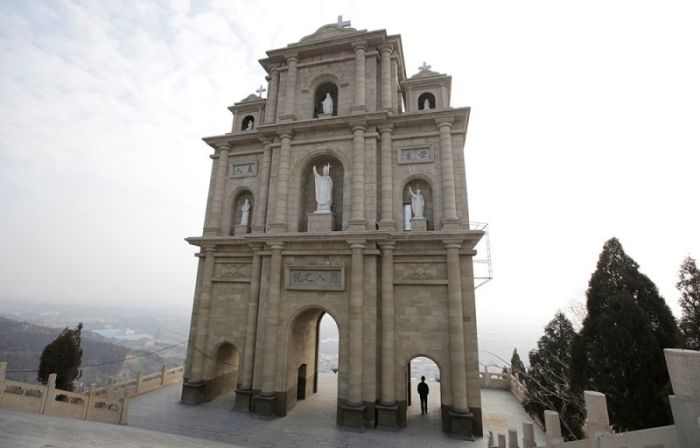Controversial Vatican-China deal renewed: 'The Holy See decided to dance with the wolf'

China and the Vatican have renewed a controversial agreement on the appointment of bishops, drawing criticism from rights groups who warn the deal will further hamper religious freedom in the communist country.
On Thursday, the Holy See and China’s Ministry of Foreign Affairs announced the renewal of the 2018 deal, due to expire this month, for another two years.
The deal, the details of which have never been published, permits the Chinese government to propose names for new bishops to the Vatican through its state-approved Chinese Patriotic Catholic Association, with the pope having veto power on the decision.
In turn, the Vatican recognizes the legitimacy of bishops previously appointed by the Chinese government and excommunicated by the church.
“The Holy See considers the initial application of the agreement — which is of great ecclesial and pastoral value — to have been positive, thanks to good communication and cooperation between the parties on the matters agreed upon, and intends to pursue an open and constructive dialogue for the benefit of the life of the Catholic Church and the good of Chinese people,” the Vatican said in a statement Thursday.
The Vatican said it signed the deal hoping to promote unity among China’s estimated 10 million to 12 million Catholics.
“[D]ialogue between the Holy See and the People’s Republic of China favors the search for the common good for the benefit of the entire international community,” it said.
However, activists have argued that the Vatican has seemingly legitimized China at a time when it continues to persecute and oppress religious minorities.
The nomination and assignment of bishops had caused tension between the Vatican and China for over seven decades. While the Catholic Church insisted that bishops be appointed by the pope, the Chinese government resisted what it viewed as foreign interference in China's internal affairs.
After the signing of the provisional agreement back in 2018, the Chinese government launched a campaign to eliminate “illegal” Catholic churches by requiring each priest to sign a document requiring them to adhere to the "independent Church.”
The document required priests to refuse relations with foreigners, prohibit religious education to young people under the age of 18, and limit religious activities to within churches.
Persecution watchdog International Christian Concern notes that China has focused its efforts on “coercing the underground clergy to join the CPCA or forcing them to give up their positions.”
It specifically mentioned the case of Bishop Guo Xijin in Mindong Diocese — who was detained for refusing to sign a document adhering to the state-run "independent Church" — and Bishop Zhuang Jianjian in Shantou Diocese, an 88-year-old bishop forced to retire after he refused to join the state-approved Catholic Church.
Gina Goh, ICC’s regional manager for Southeast Asia, called the renewal a “slap in the face for underground Catholics.”
She pointed out that despite the deal, the underground Catholics continued to face harassment and oppression with monasteries demolished, crosses removed, and priests and nuns threatened or taken away.
“The improvement of treatment for the faithful claimed by the Vatican never came true and instead turned out to be worse,” she said. “It is very unfortunate that the Holy See decided to dance with the wolf and sacrifice China’s underground Catholics for its own motives.”
Cardinal Joseph Zen, the emeritus Bishop of Hong Kong, told Voice of America that despite the Vatican’s claims, the deal has done little to protect Chinese Catholics’ religious freedom.
“What is going smoothly? How can you say it is going smoothly when you have not even appointed one single bishop?” he said.
“There must be a political motive behind this. [The Vatican] really thinks that one day it can build diplomatic relations with China. When there is a negotiation, it means there is a hope for the establishment of formal relations.”
The accord has also been condemned by the White House. Secretary of State Mike Pompeo accused the Vatican in an article and a series of tweets of putting its “moral authority” at risk by renewing the agreement.
“It is certainly the case that the Chinese Communist Party [engages in] efforts to stamp out religious freedom every place that they find,” Pompeo told The Christian Post in a recent interview.
“We all know, whether that is the Christians there, the Catholics, the Muslims in the western part of the country, the Chinese Communist Party has a very low threshold for permitting people to practice their own faiths. We think that is greatly to the harm of the country, but we know that it is to the detriment of the Chinese people themselves.”
China is ranked as one of the worst countries in the world when it comes to the persecution of Christians, according to Open Doors USA’s World Watch List.
The communist regime's crackdown on religious freedom has also led the U.S. State Department to label it as a “country of particular concern” for “continuing to engage in particularly severe violations of religious freedom.”




























